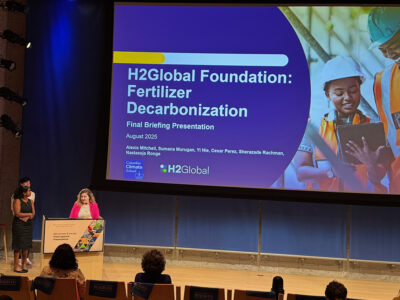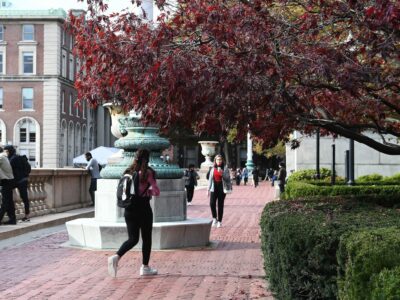
The Columbia Climate School’s faculty will expand beginning on January 1, 2025.
“With the addition of these new faculty, along with the incoming Climate School dean Alexis Abramson, who will be a professor of climate, the school’s faculty will increase to 29 in the new year,” said interim dean Jeffrey Shaman.
The following faculty will join the Climate School in the new year:
Vijay Modi, professor of mechanical engineering and of Earth and environmental engineering, will be jointly appointed as professor of climate, with tenure, effective January 1, 2025. Modi will retain his current appointments at Columbia Engineering and continue to serve as the director of the Quadracci Sustainable Engineering Lab. Modi is a recognized world leader in the area of energy access, working closely with city and national agencies and utilities to understand how energy services can be more accessible, more efficient and cleaner. Modi has advanced a unique spatial electricity planning model that can guide grid expansion in under-resourced countries, which has been put to use by the Kenyan, Nigerian and Liberian governments, among others. Modi has also made extraordinary research contributions that address the problem of urban energy consumption in developed countries. His urban energy work is at the forefront of the type of climate adaptation strategies essential for moving humanity toward a lower-carbon future.
Dan Steingart, Stanley-Thompson Professor of Chemical Metallurgy and department chair of the department of Earth and Environmental Engineering and professor of chemical engineering will be jointly appointed as professor of climate, with tenure, effective January 1, 2025. Steingart will retain his current appointments at Columbia Engineering and continue to serve as the co-director of the Columbia Electrochemical Energy Center. Steingart studies the systematic and scaling behaviors of material deposition, conversion, and dissolution in electrochemical reactors. His current research exploits traditional failure mechanisms and unwanted interactions in electrochemical reactors, turning unwanted behaviors into beneficial mechanisms. Over the last decade, his efforts in this area have been adopted by various industries and have led directly or indirectly to five electrochemical energy-related startup companies, the latest being Standard Potential, an effort to radically lower the cost of manufacturing sodium ion batteries while increasing their quality and durability.
Alan West, Samuel Ruben-Peter G. Viele Professor of Electrochemistry in the departments of Chemical Engineering and Earth and Environmental Engineering will be jointly appointed as professor of climate, with tenure, effective January 1, 2025. West will retain his current appointments at Columbia Engineering and continue to serve as the co-director of the Columbia Electrochemical Energy Center, which focuses on energy storage, green H2, electrochemical means of CO2 conversion and critical materials. West’s research interests are in energy storage, electrolysis, electrodeposition and critical materials processing. His research combines theory, experiment and numerical simulations. To improve the chances of translating laboratory discoveries to large-scale practice, he collaborates extensively with industry and works to spin out technologies.
Professors Vijay Modi, Dan Steingart and Alan West will join other new faculty who previously were announced during summer and are also joining the Climate School on January 1, 2025: Suzana Camargo (professor of climate), Michael Puma (professor of climate), Lisa Sachs (associate professor of professional practice in the faculty of climate), Jeff Schlegelmilch (associate professor of professional practice in the faculty of climate), and Gisela Winckler (professor of climate).



